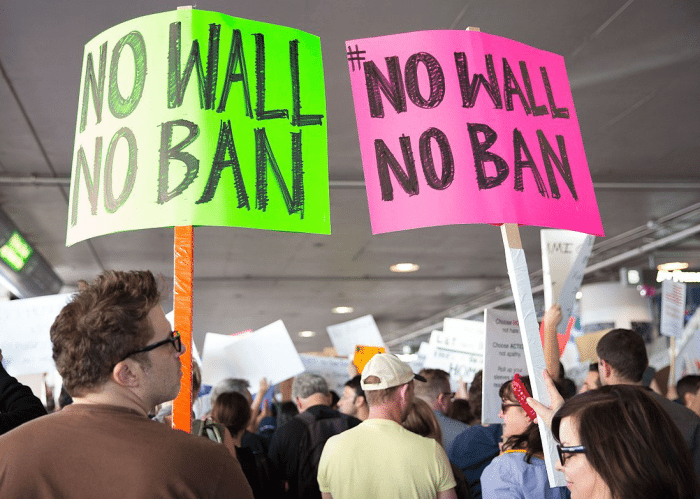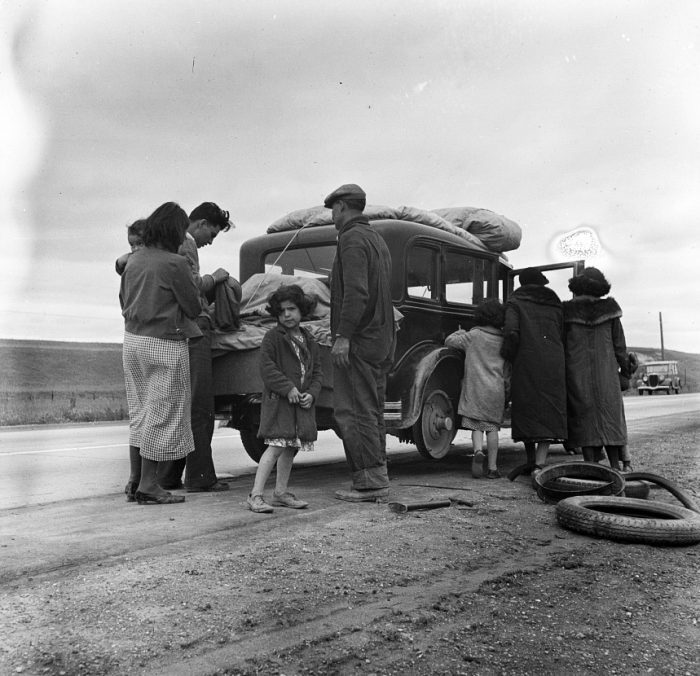Organizers who have been waiting for immigration reform are currently being bombarded by other pressing matters within the context of the immigrants rights movement. With Donald Trump in office for what seems like years. it’s hard to remember that President Obama also had a role in the country’s heavy deportation machine. Even throughout the difficult Obama years, the immigrants rights movement still made heavy strides, thanks to movements led by people who were being directly affected.
So it’s tough to watch as many well-intentioned community organizers, non-profits, and advocates go back to tired talking points. You know the ones. The ones that want an immigration reform at all costs and ignore the toll taken on small towns, forgotten communities, wage theft and exorbitant (for some) DACA fees. The talking points that only talk about how immigrants are only here to do the jobs no one else wants to do, that immigrants are in the U.S. to work, that they pay more taxes than Donald Trump. The talking points that are often spread by well-meaning folks with college degrees who have little life experience in being undocumented, and whose school education often gets in the way of the street smarts that would probably make them better allies.
The only thing those talking points have done is keep the non-profit industrial complex running while divesting resources that could have helped local and state groups craft better strategies that fit their needs. But even worse than this, many of these U.S. citizenship talking points are divisive in that they leave out the experiences of people who have been afforded citizenship yet have still have reaped the benefits they were due.
Acting as if citizenship will heal the woes experienced by undocumented folks denies that U.S. citizenship was granted to black folks, and that even as they have contributed to shaping American culture, they paid (and continue to pay) a heavy price for things that white people usually get a slap on the wrist for. A 2012 study conducted by the Malcolm X Grassroots Movement found that police extrajudicially killed a black person every 28 hours.
The fight for U.S. citizenship is noble, but it’s also anti-black, excludes indigenous peoples and their struggles, and erases the history of Asian-Americans, who are still treated as foreigners regardless of their immigration status.
I can say this because I’ve also been a crappy ally living in a forgotten town, even though I was surrounded by folks who are directly affected by immigration policies. And hell, I became a U.S. citizen in 2011, so I’ve been there during purer times. Even that doesn’t qualify me for understanding the complexity of being undocumented under Trump, when there is so much surveillance technology, and in a country where even green card holders are freaked out. These times are different, and require us to do better to check our privilege (that means YOU, green card holder that’s applying for your N-400 as I type).
A Brief History on US Citizenship Not Saving Folks
African Americans were granted American citizenship through the 14th Amendment, which was adopted on July 28, 1868. This excluded Native Americans, who were granted U.S. citizenship in 1924 under the Snyder Act, which was nicknamed the Indian Citizenship Act. As we can see throughout American history, citizenship still wasn’t enough to protect the African American from lynchings, voter disenfranchisement, or death caused by police brutality.
Native Americans have consistently been denied their right to live in a clean environment, their stories have been made invisible, and if #NoDAPL has shown us anything, it’s that the system always finds ways to get its way and violate the promises it makes to indigenous peoples.
The United States also passed the Chinese Exclusion Act in 1882, which wasn’t repealed until 1965. This was one of the first significant laws created to exclude a group. Let’s not forget that during World War II, President Franklin D. Roosevelt ordered Japanese-American internments and 127,000 US citizens were locked up due to their heritage. Or “Operation Wetback” and the Mexican Repatriation.
Arabs and people of Muslim descent have also been targeted due to their race or religion under the National Security Entry-Exit System (NSEERS). This was a database that tracked Arabs and Muslims after September 11 in order to see if there are links to terrorist activity. Instead, it worked to racially profile the Muslim community and fuel negative stereotypes.
While we’re at it, we also have to discuss Puerto Rico and its status as a U.S. territory. People born in Puerto Rico obtained the right to become U.S. citizens in 1917, and even that is complicated. They can only vote for President if they resides in any of the country’s 50 states, are not represented in Congress, and their status is a territory was used as an excuse not to help Puerto Rico restructure its debt. Puerto Rico, like the rest of Latin America, is racially diverse. Surveys show that most Americans don’t know that Puerto Ricans are U.S. citizens, but having this citizenship hasn’t exactly been the saving grace of Puerto Ricans, who are some of the poorest groups in the Northeast.
To be fair, most undocumented youth groups and community groups led by volunteers and people who are directly affected have addressed issues of intersectionality and have done a solid job of working with groups such as Black Lives Matter as well as addressing anti-blackness that is so prevalent in Latino, Asian and other immigrant communities.
Still, the problem is us: the citizens who often end up working in non-profits meant to serve undocumented people don’t always include the community in conversations because of a false sense that “speaking for” others protects them. Anyone who is undocumented, black, trans, or otherwise marginalized in the United States is always at risk and has to carry that weight, so it’s important to respect a person’s right to be vocal (or not) about how their life experiences shape their quest for social justice.
In focusing on citizenship, many in the immigrants rights movement have begun a dangerous trend of wasting precious funding on DC event, when many grassroots groups and organizations that focus on local and state organizing could have used the money to change politics at the local level. But even worse, large organizations that claim the largest swaths of cash have popularized talking points that make citizenship a beacon of hope for people without taking history into account. As Latinos, we also have to deal with a culture that encourages colorism and encourages anti-blackness. Our own Latin American countries are also behind when it comes to the treatment of black folks, and though changing the world is tough, we still have to do our best to confront the problems our movements face in the United States.
Citizenship comes with some perks, such as being able to vote, travel, and apply to certain jobs. But citizenship in the United States does not confer human rights. If it did, there would have been no lynchings after the Civil War. We wouldn’t know who Emmett Till was because he would have been allowed to live. We wouldn’t have needed a Civil Rights Movement, a Black Lives Matter movement, there would be no need for Asian Americans and Muslims who grew up in the United States to have to answer obnoxious questions about where they’re really from.
On a recent interview with Stephen Colbert, Roy Wood Jr. explained why black men are always taught to leave a store with a bag.
“As a black man in this country, people need to know I paid for this stuff,” he says. Wood also said that he sees what’s happening to other minorities and that they know they’re next. African Americans voted for Hillary Clinton at a rate of 88%, while black women voted for Clinton at rates of 94% so that we wouldn’t be in the shithole in which we now find ourselves.
I can’t say that being a U.S. citizen doesn’t come with certain privileges. We can vote, worry far less about deportation, and have better work and educational choices. Even in the quagmire that is the U.S. immigration system, we worry less about undocumented partners in case of marriage because we can petition them. The only thing citizenship doesn’t do is suddenly shield a person of color from the cruel sometimes lethal effects of white supremacy. This is a pretty big influencer, and this is why we have to stop putting citizenship on a pedestal and fight for the human rights of all people regardless of citizenship.
We’ve done a great job of misinforming the undocumented community that citizenship can suddenly transform and transcend things. We do a great job of brainwashing people into assimilating into American culture when this very process is the reason why we have so many Ben Carsons, Marco Rubios, and Michelle Malkins in the world (Bobby Jindal, I didn’t forget you!). This way of discussing citizenship is inherently anti-black, and also contributes to the erasure of indigenous peoples in American history while also ignoring the ways the United States has dehumanized Asian-Americans and people from the Middle East.
It’s time to stop using how “American” immigrants are as talking points when this education causes people to gain new prejudices at the expense of other people’s human rights.
As I type this, I’m in the safe cocoon of Buenos Aires, where for about 30 years the government had a public health system that treated anyone for free regardless of nationality, allowed foreigners to study in its universities for free regardless, and where speaking more than one language isn’t demonized. But hey, they throw some people a bone and their citizenship and residency process is a lot friendlier than that of the United States. This is changing now thanks to the Pink Tide, but privileged people who organize in favor of human rights could learn a thing or two from this: human rights are above any piece of paper.
In the absence of being able to support a utopian an idealistic premise such as this, the simple solutions at the moment seem to be:
- We should listen to those directly affected.
- We should support local and state battles and strategies.
- We must recognize that any and all forms of discrimination against any given group always ends up screwing black people eventually.
- The Civil Rights Movement we often use as inspiration paved the way, and we must always defend the axiom that Black Lives Matter.
But please, let me know what other suggestions are available, or if you think/know/can prove I’m wrong.
***
Ingrid Cruz tweets from @ingridiswriting. For more about her and her writing, visit her website.




